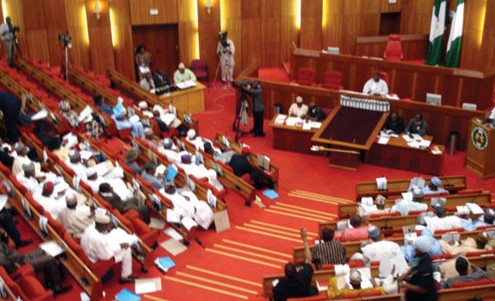The Airline Operators of Nigeria, AON, on Sunday attributed the poor performance of domestic airlines to multiple taxation by various agencies in the aviation sector.
Nogie Meggisson, Chairman, AON, made the claim in Lagos while reacting to the takeover of Arik Air and Aero Contractors by the Asset Management Company of Nigeria, AMCON.
AMCON took over Arik, Nigeria’s largest domestic airline, last week, and said on Sunday that the airline was in a “huge mess” and was poorly managed.
According to a statement released by the AON chairman, the aviation agencies mentioned include the Nigerian Civil Aviation Authority, NCAA, Nigerian Airspace Management Agency, NAMA, and the Accident Investigation Bureau, AIB.
Others are the Federal Airports Authority of Nigeria, FAAN, the Nigerian Meteorological Agency, NiMet, and the Nigerian College of Aviation Technology, NCAT, Zaria.
Mr. Meggisson, in the statement sourced by the News Agency of Nigeria, lamented that it was unfortunate the system had failed
to recognise the pivotal role airlines could play in bringing the nation’s economy out of recession.
“Rather, the system is continuously manipulating, feasting and pushing the financial envelope of airlines by inflicting multiple taxes and levies to the extent that airlines are now groaning under the pressure and some are going bankrupt.
“AON has been screaming and complaining about the same issue over the years that have culminated in sending over 27 airlines under in the past 25 years.
“A case in point is the recent takeover of Arik Air and Aero Contractors by AMCON in the face of huge financial burdens that have shown themselves as fallout of the multiple and sometimes unfair charges and taxes airlines are forced to grapple with on a daily basis.
“This is without recourse to the fact that aside from all the multiple charges, levies and fees, airlines still have to pay mandatory statutory corporate taxes to relevant agencies,” he said.
According to the airline operator, airlines meet so many costly foreign exchange components on daily basis that accounts for 70 to 80 per cent of their direct operational cost. These include jet fuel, spare parts, insurance and simulator training.
Mr. Meggison added that in spite of the numerous challenges, the agencies continue to over-burden the airlines with multiple taxes and levies which further puts strain on their operations and finances.
“The Civil Aviation Act of 2006 (Part 18.12.3) requires that the NCAA regulates civil aviation and the charges imposed by civil aviation authorities and/or agencies,” he said.
“These charges, in consultation with stakeholders,are to be approved and reviewed periodically by both parties. On the contrary however, airlines are saddled with charges without any form of consultation whatsoever.
“Domestic airlines, on the average, pay about 35 per cent to 40 per cent of a ticket cost as taxes and charges that come under the guise of statutory levies in addition to other charges. These include 5 per cent Ticket Sales Charge, 5 per cent Cargo Sales Charge, 5 per cent Value Added Tax (VAT), Passenger Service Charge, Charter Sales Charge, Aircraft Inspection Fees, Simulator Inspection Fees, Landing Charges and Parking Charges.
“Others are Terminal Navigational Charge, Enroute Charge, Fuel. Surcharge, Airport Space Rent, Electricity Charges, and Apron Pass, Ramp Access Charges, ODC and a newly imposed Registration Fee all of which are paid to government agencies.
Mr. Meggison said the taxes amount to double taxation, adding that all incentives provided by government are being taken back.
“Many of these taxes and charges amount to double taxation such that any incentive seemingly provided by government to airlines is taken back by the agencies.”
The AON boss also disclosed that even with all these charges, many of the airports in the country do not have runway lights and navigational landing aids which meant such airports are only open between 7 a.m. and 6 p.m. daily.
“To this end, airlines can’t fully utilise their airplanes for 24-hours operations. No airplane or factory machine can be profitable only from 7 a.m. to 6 p.m. daylight operations,” he noted.
“Airplanes and factory machines are supposed to operate for 24-hours. Airlines also sometimes have to pay arbitrary extension fees or cancel a flight entirely with the attendant burden and inconvenience due to no fault of theirs.”
He, therefore, called for a total harmonisation of all agencies’ charges into a single payment system, as contained in the recent proposal of a committee set up by government and supported by the airlines.
He said streamlining all fees and charges by the various government agencies into a single window will remove any confusion and double billing.
Mr. Meggisson also called for the provision of airfield lighting and navigational landing aids at all airports in Nigeria to reduce delays and cancellations and allow for 24-hours operation and better utilisation of airplanes.
He also appealed to the government to extend tax holidays for the first 10 years for qualifying airlines, noting that it would cushion the impact of start-up to ensure the survival and growth of domestic airlines.
“Airlines provide a critical socio-economic services and should not be treated as a cash cow and strangled out of existence by multiple taxes, levies and charges that are sometimes forced on the airlines without due consultations,” he said.
“We believe that government needs to reappraise the way it sees air transportation and accord it the support it truly deserves as done in other climes.”











